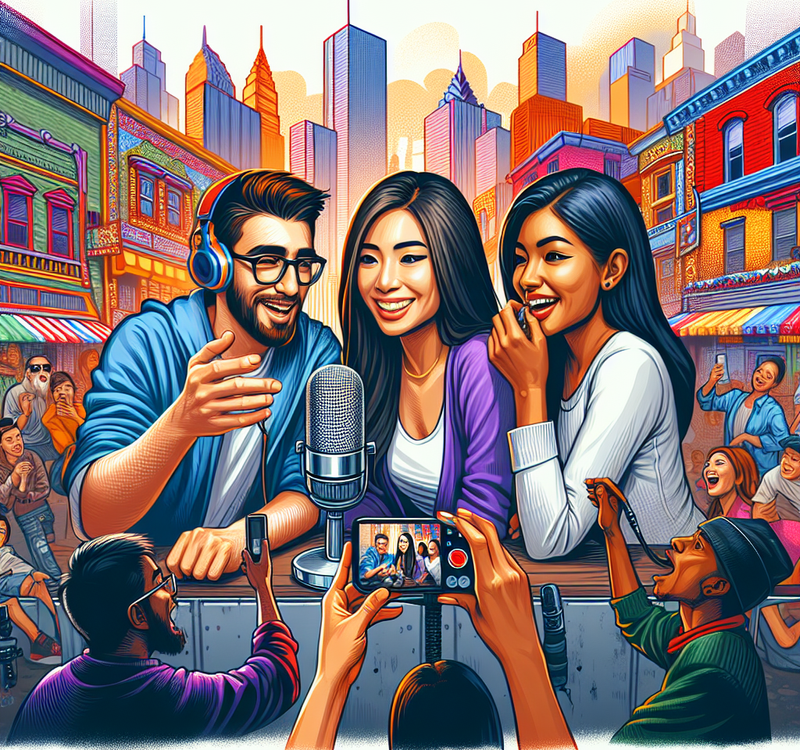
The Ultimate Guide to Harnessing the Power of Influencer Campaigns
16 August، 2023Maximizing Marketing Success: Combining Paid Ads and Influencer Campaigns for Unmatched Impact

Title: Maximizing Marketing Success: Combining Paid Ads and Influencer Campaigns for Unmatched Impact
SEO Meta-Description: Learn how influencer marketing fits into the marketing mix, the challenges of implementing an influencer engagement strategy, and how to use influencers for successful marketing campaigns. Discover the key factors that impact influencer marketing effectiveness and why paid media plays a crucial role. Find out how Araboost, a cutting-edge influencer marketing platform, can help you streamline your influencer campaigns and achieve unprecedented marketing success. Visit Araboost (https://araboost.com) to automate influencer selection, campaign management, and performance estimation.
Introduction:
In today’s digitally-focused world, traditional marketing strategies alone may fall short in driving the desired impact and reaching the target audience effectively. Businesses are continually seeking innovative approaches to maximize marketing success. This article explores the immense potential of combining paid advertisements with influencer campaigns, resulting in an unmatched impact and amplified brand exposure. Throughout this article, we will delve into how influencer marketing fits into the marketing mix, the challenges associated with implementing an influencer engagement strategy, how to leverage influencers to execute successful marketing campaigns, and the factors that significantly impact influencer marketing effectiveness. Additionally, we will introduce Araboost, an unrivaled influencer marketing platform designed for the MENA region, which simplifies influencer selection, campaign management, and performance estimation.
Maximizing Marketing Success: Combining Paid Ads and Influencer Campaigns for Unmatched Impact
When it comes to marketing, an integrated approach is often the most effective way to achieve results. By combining paid advertisements and influencer campaigns, brands can create a powerful synergy that produces unparalleled impact. Paid ads offer precise targeting and broad reach, while influencer campaigns add authenticity, credibility, and the potential for viral exposure.
By leveraging the power of influencers, brands can tap into their extensive networks and engage with their highly engaged audiences. Influencers have built a strong rapport with their followers, making their recommendations and endorsements highly influential. Additionally, partnering with influencers allows brands to access niche markets and demographics that are often challenging to reach through traditional advertising channels.
The Challenge of Implementing an Influencer Engagement Strategy
While influencer marketing has proven to be effective, it comes with its own set of challenges. One of the main obstacles brands face is identifying the right influencers and developing an effective engagement strategy. The three main challenges when rolling out an influencer engagement strategy are:
-
Finding the Right Influencers: Identifying influencers who align with your brand values, target audience, and campaign objectives can be a daunting task. It requires thorough research, analysis, and understanding of an influencer's reach, engagement rates, and authenticity.
-
Building Strong Relationships: Once the ideal influencers are identified, building strong relationships is crucial. It involves effective communication, mutual trust, and a clear understanding of campaign objectives. Developing partnerships that go beyond mere transactions is essential for long-term success.
-
Measuring ROI and Effectiveness: Measuring the return on investment (ROI) and effectiveness of influencer campaigns can be challenging. Brands must set clear goals, define key performance indicators (KPIs), and track the impact of influencer collaborations accurately.
How to Leverage Influencers for Successful Marketing Campaigns
To execute successful marketing campaigns using influencers, brands should consider the following strategies:
-
Set Clear Objectives: Clearly define your campaign objectives and align them with your overall marketing goals. Whether it's to increase brand awareness, drive website traffic, or boost sales, having a clear roadmap is essential.
-
Identify Relevant Influencers: Conduct thorough research to identify influencers who are relevant to your industry and target audience. Look for influencers who have a genuine passion for your niche and actively engage with their followers.
-
Foster Authentic Partnerships: Build authentic relationships with influencers based on mutual trust and shared values. Genuine collaborations create a more organic and compelling experience for the influencer's audience, resulting in higher engagement and increased brand loyalty.
-
Content Collaboration: Co-create content with influencers to leverage their creativity and expertise. Encourage influencers to develop content that aligns with their style while incorporating key brand messages. This approach maintains authenticity while promoting brand visibility.
-
Track and Measure Performance: Track the performance of your influencer campaigns through robust analytics tools. Monitor engagement rates, website traffic, conversions, and other relevant metrics to assess the effectiveness of your collaborations. Adjust your strategies based on the data to optimize results.
Factors Impacting Influencer Marketing Effectiveness
Several factors significantly impact the effectiveness of influencer marketing. Understanding these factors can help brands unlock the full potential of their influencer campaigns. The following factors play a vital role:
-
Influencer-Brand Fit: The alignment between an influencer and a brand is essential for a successful partnership. A strong fit substantiates the authenticity and credibility of the collaboration, resulting in increased trust from the influencer's audience.
-
Audience Relevance: Ensure that the influencer's audience aligns with your target market. Selecting influencers who have a substantial number of followers from your desired demographic increases the chances of reaching a receptive audience.
-
Engagement and Reach: Analyze an influencer's engagement rate, including likes, comments, and shares on their content. However, it's not just about the total number of followers. The quality of engagement is equally crucial for campaign success.
-
Content Quality: Influencers with high-quality content that resonates with their audience are more likely to drive meaningful interactions. Aesthetic appeal, storytelling, and uniqueness are some essential elements to consider.
-
Consistency and Frequency: Consistency and regular posting maintain the influencer's connection and engagement with their audience. Continuous exposure helps build trust and keeps the brand top of mind.
What is Paid Media and Its Role in Influencer Marketing?
Paid media refers to any form of advertising that involves payment in exchange for branded content exposure. It plays a crucial role in influencer marketing campaigns, complementing and enhancing the overall marketing mix. Paid media in influencer marketing encompasses:
-
Sponsored Posts: Brands collaborate with influencers by compensating them for sharing sponsored posts that promote their products or services. Sponsored posts often include explicit calls to action and drive direct conversions.
-
Influencer Endorsements: Brands pay influencers to endorse and recommend their products or services. Influencer endorsements carry significant weight as they stem from an authentic relationship with the influencer's audience.
-
Sponsored Events or Trips: Brands may sponsor events or trips in collaboration with influencers to promote their products or services. This allows influencers to create engaging content in a unique and captivating environment, providing valuable exposure for the brand.
Incorporating paid media into influencer campaigns amplifies their reach, ensuring that branded content reaches a wider audience. It also provides brands with more control over the messaging and timing of their campaigns.
Araboost: Streamlining Influencer Marketing for Unmatched Impact
Araboost is a cutting-edge influencer marketing platform designed specifically for the MENA region. It offers advertisers an effortless and seamless experience comparable to running ads on major digital ad platforms like Google and Facebook. Our platform streamlines influencer marketing by automating influencer selection, campaign management, and performance estimation.
Rephrased Product Description: Araboost is revolutionizing influencer marketing in the MENA region with its efficient and comprehensive platform. It allows advertisers to effortlessly connect with influencers, manage campaigns seamlessly, and measure performance accurately. With Araboost, brands can streamline their influencer marketing efforts and achieve unparalleled impact. Visit Araboost (https://araboost.com) to access the power of influencer marketing in the MENA market.
Conclusion:
Combining paid advertisements with influencer campaigns is a game-changing strategy that can maximize marketing success. By understanding how influencer marketing fits into the marketing mix, overcoming the challenges associated with implementing an influencer engagement strategy, leveraging influencers for successful marketing campaigns, and considering the factors that impact influencer marketing effectiveness, brands can unlock tremendous opportunities for growth and brand visibility. With Araboost’s cutting-edge influencer marketing platform, brands can streamline their influencer campaigns and achieve unmatched impact in the dynamic digital landscape.
FAQs:
1. How does influencer marketing fit into the marketing mix?
Influencer marketing complements traditional marketing channels by leveraging the power of trusted influencers to engage with target audiences authentically. It adds credibility, authenticity, and the potential for viral exposure, making it an essential component of the modern marketing mix.
-
What are the main challenges when rolling out an influencer engagement strategy?
The main challenges include finding the right influencers, building strong relationships, and accurately measuring the ROI and effectiveness of influencer campaigns. -
How can influencers be effectively used to execute successful marketing campaigns?
Brands can leverage influencers by setting clear objectives, identifying relevant influencers, fostering authentic partnerships, encouraging content collaboration, and tracking campaign performance for optimization. -
What factors have the biggest impact on influencer marketing effectiveness?
The influencer-brand fit, audience relevance, engagement, reach, content quality, consistency, and frequency are key factors that significantly impact the effectiveness of influencer marketing campaigns. -
What is paid media's role in influencer marketing?
Paid media in influencer marketing includes sponsored posts, endorsements, and sponsored events. It amplifies reach, enhances messaging control, and ensures broader exposure for branded content.



